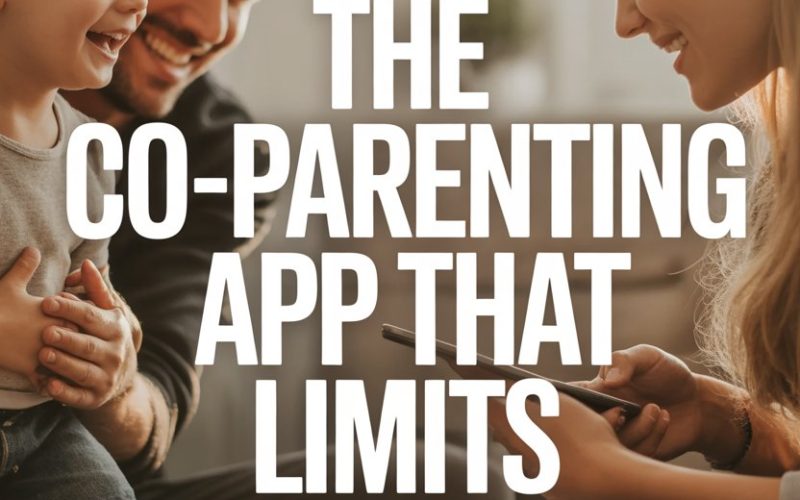Oh, co-parenting. Equal parts logistics, diplomacy, and “why are there three missing shoes in this bag?”
For many separated or divorced parents, technology is a lifeline—texting, calendars, and, occasionally, a group chat that feels more like a tribunal.
But what happens when communication turns sour, or “flexible” suddenly means “one parent always gets their way”?
Here’s where a co-parenting app steps in and quietly, efficiently, keeps everything above board—like a digital Switzerland for your family.
Let’s talk about the app (and the mindset) that puts kids first, even when adults might be tempted to play games.
Why Manipulation Creeps In
Co-parenting isn’t just about who drives to netball practice. It’s also about figuring out who pays for the dentist, when the birthday party falls during “your time,” and the subtle (and sometimes not-so-subtle) attempts to get the upper hand.
Research published in the Journal of Family Psychology shows that high-conflict communication between separated parents is linked to poorer outcomes for children.
When conversations devolve into power plays, the kids notice. They may start feeling like pawns, and let’s be honest—most would rather be anywhere but the chessboard.
Manipulation comes in many forms:
- Withholding information (“Oh, did I forget to mention the school play?”).
- Moving the goalposts (“Actually, I need them back an hour earlier…”).
- Triangulating through the children (“Tell your mum I said no ice cream!”).
Co-parenting apps offer a neutral ground, logging exchanges and minimising the opportunities for these games.
Meet the Manipulation-Busting App
Enter apps like OurFamilyWizard, which was designed by divorced parents and recommended by family courts around the world (including the UK, USA, Australia, and Canada).
The premise is simple: all communication, schedules, expenses, and changes happen in one secure place.
Unlike WhatsApp or texting, where messages can “accidentally” disappear, these apps create a transparent record. If you’re worried about a parent sneakily editing that pick-up request, rest easy—edits and deletions are logged.
There are even features that can analyse message tone, flagging when someone’s getting a bit too snarky or passive-aggressive. Think of it as your own digital referee, minus the whistle.
What Makes These Apps Different
Not all apps are created equal. The best co-parenting apps limit manipulation in a few clever ways:
- Message permanence: Once you’ve sent a message, it’s part of the record. Editing, deleting, or “misplacing” texts is a thing of the past.
- Shared calendar: No more “I never agreed to that!” Dads, mums, bonus parents, and sometimes even older kids can see exactly what’s happening, when, and where.
- Expense tracking: Every “I paid for piano lessons; your turn for footy boots” is logged. Receipts can be uploaded. The days of “I swear I gave you £20 for that” are over.
- Tone monitoring: Some apps use algorithms to spot inflammatory language, gently prompting the sender with a message like, “Would you like to rephrase that?” (Honestly, imagine if email did this for everyone.)
For parents who have experienced high-conflict splits, these features aren’t just convenient—they’re game-changers.
How the App Disarms Power Plays
Transparency is the enemy of manipulation.
When both parties know that every calendar change, every reimbursement request, and every “Can you swap next weekend?” is permanently recorded, there’s less incentive to twist the truth.
If one parent tries to claim, “You never told me about the parent-teacher night,” the app provides receipts—literally. Everything is timestamped and backed up.
The same goes for finances. Those last-minute “urgent” expenses? Now, there’s a record, with the option to upload receipts and see who’s paid what.
No more tallying IOUs on the back of a cereal box.
And when communication is tracked, parents often pause before hitting send on that scathing message.
Tone checkers might not turn everyone into saints overnight, but they up the odds of keeping things civil—or at least more civil than the average WhatsApp spat.
Balancing Structure With Flexibility
One of the biggest worries parents have about these apps is that everything becomes too rigid. What if life happens—illness, work trip, or a flat tyre—and you need to swap days?
Good co-parenting apps allow for requests and changes, but make sure both sides are aware and agree. If there’s a conflict, the app keeps track of who asked what, when, and why.
Courts sometimes even encourage or require parents to use these apps for precisely this reason: structure with room for reasonable flexibility.
Schedules can be as detailed or bare-bones as you like. If you want to add every club, dentist appointment, and birthday party, it’s there. If you stick to basics, that’s fine too.
The point is, everyone can see the same information—no surprises.
Putting Children at the Centre
All the bells and whistles are lovely, but the real winner is your child. When parents communicate clearly and keep arguments out of earshot, children feel safer and more secure.
A study by the University of Virginia found that even when parents split, children do better when adults cooperate and limit conflict. It’s not about having a perfect relationship with your ex; it’s about keeping things as smooth as possible for your kids.
Many apps also have a “shared journal” or information centre—a spot to share updates about your child’s week, medical details, or even those random requests from the teacher for six toilet rolls by Friday (don’t ask).
This keeps communication focused on the child, not the drama.
Privacy and Security: No Eavesdropping Allowed
For anyone worried about prying eyes, these apps are built with privacy in mind. Data protection is usually top-notch, and only approved users can access your family’s information.
And if you’re thinking, “Do I really want everything on record?”—that’s often a plus, not a minus. Especially if your co-parent has a creative memory.
If you’re navigating a situation where safety is a concern, these apps allow you to control who sees what, and courts have praised them for reducing risky or abusive contact.
Bringing Third Parties Onboard
Life gets complicated. New partners enter the scene. Grandparents want to be kept in the loop for birthday parties or end-of-term concerts.
Many co-parenting apps let you add “connections”—people who can view certain events or information. Instead of repeating yourself (and potentially causing confusion), you can make sure everyone has the same info.
It saves a heap of group texts and awkward explanations.
When the Other Parent Isn’t Keen
Here’s the rub: You can’t control what your ex does. If you’re excited about using an app and they’re not interested, it can feel a bit deflating.
Courts in the UK and elsewhere sometimes require both parents to use a co-parenting app in high-conflict cases. If it’s not court-ordered, you can still use it to keep your own records, share what you can, and offer the olive branch.
You might get lucky—sometimes, seeing how streamlined things become is enough to bring a reluctant co-parent around. If not, at least you’ll have your ducks in a row.
Affordable Peace of Mind
Not every parent can shell out for premium subscriptions, but there are free and low-cost options like Cozi and AppClose, which offer basic scheduling and messaging features.
Paid apps like OurFamilyWizard or TalkingParents tend to offer court-friendly features, message archiving, and expense tracking. Some local authorities or charities will even subsidise the cost in high-conflict cases, so it’s worth asking.
The truth is, having a clear record can save time, money, and endless headaches—no matter what the upfront cost.
Making It Work for Your Family
Adopting a co-parenting app isn’t just about signing up and hoping for the best. Here are some practical tips:
- Agree on ground rules: Talk to your co-parent about which features you’ll use. Stick to the app for all “official” business to avoid confusion.
- Keep it businesslike: Imagine you’re drafting a work email—cordial, clear, and free of barbed comments about who left the school shoes at grandma’s last weekend.
- Update regularly: Update the calendar and expenses as things come up. Don’t wait until the night before the school trip!
- Use the features: Shared journals, medical info, and document storage are lifesavers. The more you use them, the less likely you’ll need to trawl through old emails.
- Encourage feedback: If something’s not working, flag it early. Apps keep a record, but they don’t replace common sense.
The Secret Ingredient: Tone
No app can force two people to be polite. But when every message is logged and potentially visible to a judge, most parents suddenly find their inner diplomat.
The real power of these platforms isn’t the technology; it’s the subtle nudge towards accountability. When you know your words matter—and might be referenced in six months—you’re more likely to keep it civil.
It’s not just about limiting manipulation. It’s about modelling healthy communication for your kids and, dare we say, making life a bit less stressful for everyone.
Less Drama, More Parenting
Co-parenting will never be simple, but it doesn’t have to feel like a never-ending episode of EastEnders.
When you shift communication out of private texts and into a transparent, kid-focused platform, manipulation loses its footing.
The best co-parenting apps do more than organise schedules—they level the playing field, keep everyone honest, and gently nudge grownups to act, well, more grown up. And that’s a win for any family.
If you’re ready to spend less time fact-checking your ex and more time being the parent your kids need, a co-parenting app could be your new secret weapon. (Just don’t expect it to find those three missing shoes.)




